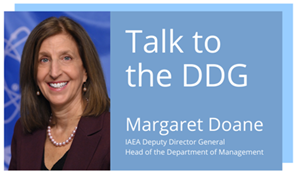
Have you ever had imposter syndrome?
Yes! In almost every job I’ve had. If you’re a conscientious person, you’ll feel the same. But just remember: you were hired for a reason!
Deputy Director General (DDG) and Head of the Department of Management Margaret Doane met with UN-NYG as part of the “Talk to the DDG” series to share her insights and advice on professional paths, career progression and the IAEA’s new mentorship programme.
Sharing experiences from her extensive career at the US Nuclear Regulatory Commission (NRC), DDG Doane reflected on how the world of work has changed since she graduated, the differences between national and international organizations, how to deal with imposter syndrome, what advice she’d give her younger self and much more. Thanks to DDG Doane for her time, insight and willingness to answer some tough questions.
Ms Doane shared 6 tips for young professionals at the start of their careers.
Be curious. Don’t be shy, read everything you can and volunteer to take on projects. You never know where it might take you or when information will come in useful. Working at the NRC wasn’t always in DDG Doane’s plan. She left her full time, permanent job as a lawyer and took a temporary job at the US NRC so she could be closer to a sick family member. Despite colleagues telling her otherwise, this ‘step down’ actually tuned out to be the best career move she could make. Reading everything that came across her desk meant that when the NRC restructured and opened up a new law office, she was the expert on some of the hottest issues. You never know when some information you’ve read will come in handy in your career.
Make the most of every situation. Working in nuclear law, there are inevitably lots of complicated cases. Some of the work that people didn’t want to do – because it was too messy or long – DDG Doane took it on. By working in so many different areas of nuclear law, from nuclear waste disposal to HR, she gained a breadth of knowledge that she wouldn’t have otherwise had and built lasting working relationships along the way.
Networking is more than how many LinkedIn connections you have. Networking is only useful if you nurture and build good lasting relationships. You come across so many different people in your career in lots of different areas and you never know when you might work with them again. Take the time to get to know the people you work with, both in your area and further afield.
Impressed by someone? Mirror that effective behaviour. Even if you’re new to a company, whether an intern or a manger, if you’re impressed by someone, let them be your role model. Mirror their approach in a way that feels true to you and see how to handle situations differently.
You could be the expert in the room. It’s a stereotype that DDG Doane admits is true: young people bring energy to an organization. Just because you’re a new starter or comparatively young doesn’t mean you have nothing to bring to the table. You have different and exciting perspectives from previous jobs, you’ve used the latest technology at university, or maybe you’re the person that can see things from a new angle.
Take a moment to recalibrate. Planning ahead and finding out what you want from a career is a good thing, but don’t force yourself through progression because you feel you have to. Work can be more than the linear path from junior, senior to manager. See what’s out there and be open to new career paths like DDG Doane did, who went from law to international programmes and back again. And always remember to take some time for yourself and your family.
Ms Doane also spoke about her extensive experience as a mentor and mentee and encouraged young professionals to sign up for the IAEA’s new mentorship programme. A mentor can help guide you through your career plans, brings in a perspective that is different from the one of supervisors or peers, and is a great sounding board for advice on how to tackle a challenge or important decision at work.

